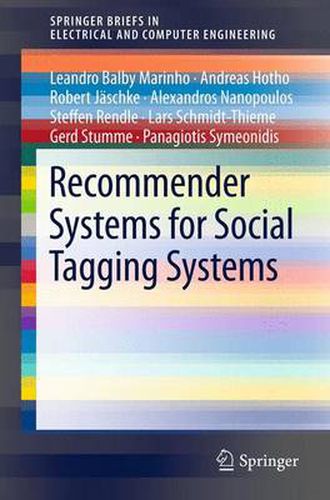Readings Newsletter
Become a Readings Member to make your shopping experience even easier.
Sign in or sign up for free!
You’re not far away from qualifying for FREE standard shipping within Australia
You’ve qualified for FREE standard shipping within Australia
The cart is loading…






This title is printed to order. This book may have been self-published. If so, we cannot guarantee the quality of the content. In the main most books will have gone through the editing process however some may not. We therefore suggest that you be aware of this before ordering this book. If in doubt check either the author or publisher’s details as we are unable to accept any returns unless they are faulty. Please contact us if you have any questions.
Social Tagging Systems are web applications in which users upload resources (e.g., bookmarks, videos, photos, etc.) and annotate it with a list of freely chosen keywords called tags. This is a grassroots approach to organize a site and help users to find the resources they are interested in. Social tagging systems are open and inherently social; features that have been proven to encourage participation. However, with the large popularity of these systems and the increasing amount of user-contributed content, information overload rapidly becomes an issue. Recommender Systems are well known applications for increasing the level of relevant content over the noise that continuously grows as more and more content becomes available online. In social tagging systems, however, we face new challenges. While in classic recommender systems the mode of recommendation is basically the resource, in social tagging systems there are three possible modes of recommendation: users, resources, or tags. Therefore suitable methods that properly exploit the different dimensions of social tagging systems data are needed. In this book, we survey the most recent and state-of-the-art work about a whole new generation of recommender systems built to serve social tagging systems. The book is divided into self-contained chapters covering the background material on social tagging systems and recommender systems to the more advanced techniques like the ones based on tensor factorization and graph-based models.
$9.00 standard shipping within Australia
FREE standard shipping within Australia for orders over $100.00
Express & International shipping calculated at checkout
This title is printed to order. This book may have been self-published. If so, we cannot guarantee the quality of the content. In the main most books will have gone through the editing process however some may not. We therefore suggest that you be aware of this before ordering this book. If in doubt check either the author or publisher’s details as we are unable to accept any returns unless they are faulty. Please contact us if you have any questions.
Social Tagging Systems are web applications in which users upload resources (e.g., bookmarks, videos, photos, etc.) and annotate it with a list of freely chosen keywords called tags. This is a grassroots approach to organize a site and help users to find the resources they are interested in. Social tagging systems are open and inherently social; features that have been proven to encourage participation. However, with the large popularity of these systems and the increasing amount of user-contributed content, information overload rapidly becomes an issue. Recommender Systems are well known applications for increasing the level of relevant content over the noise that continuously grows as more and more content becomes available online. In social tagging systems, however, we face new challenges. While in classic recommender systems the mode of recommendation is basically the resource, in social tagging systems there are three possible modes of recommendation: users, resources, or tags. Therefore suitable methods that properly exploit the different dimensions of social tagging systems data are needed. In this book, we survey the most recent and state-of-the-art work about a whole new generation of recommender systems built to serve social tagging systems. The book is divided into self-contained chapters covering the background material on social tagging systems and recommender systems to the more advanced techniques like the ones based on tensor factorization and graph-based models.